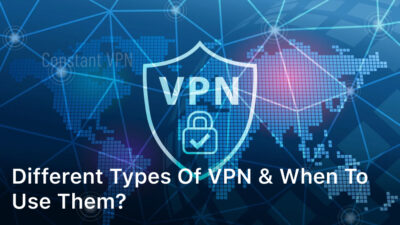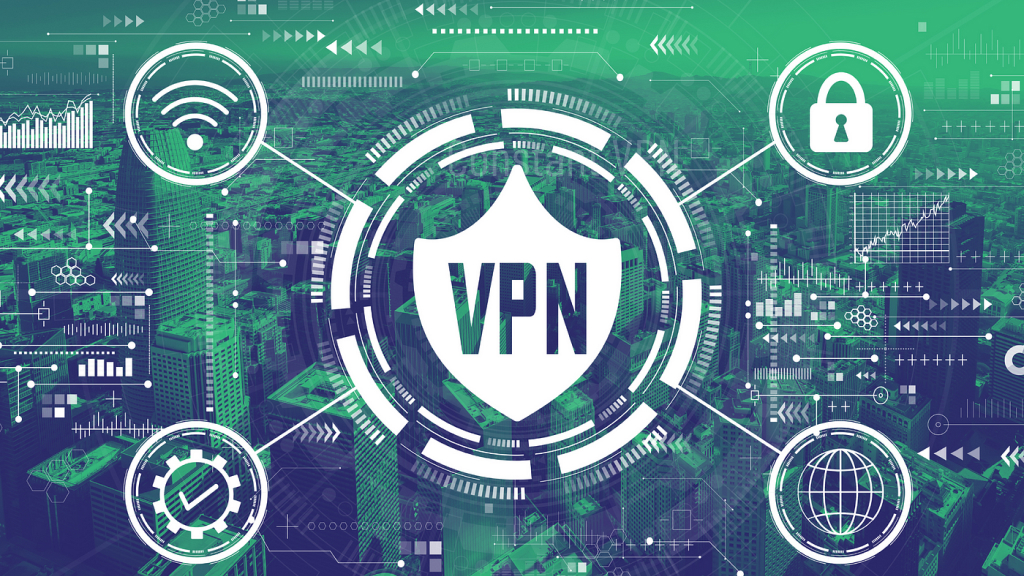Different Types Of VPN & When to Use Them?

Welcome to our comprehensive guide on different types of VPN, encrypted technologies, and secure VPN options. In this article, we will delve into the world of virtual private networks, exploring various VPN protocols, virtual private network types, VPN services, types of VPN connections, VPN technologies, VPN encryption methods, VPN server types, and secure VPN options.
As online security and privacy become increasingly important, it is crucial to understand the diverse range of VPN options available. By selecting the right VPN protocol, encryption method, and service provider, you can ensure a secure and reliable VPN connection. Whether you need to remotely access your work network, establish a secure connection between different locations, or protect your personal data from prying eyes, knowing the different types of VPN and when to use them is essential.
In the upcoming sections, we will dive deeper into VPN protocols and encryption methods, explore the various virtual private network types, guide you in choosing the right VPN service based on your needs, and provide a conclusion that summarizes the key takeaways.
So, let’s get started on this insightful journey to discover the world of secure VPN options!

Understanding VPN Protocols and Encryption Methods
When it comes to virtual private networks (VPNs), understanding the different VPN protocols and encryption methods is essential in ensuring a secure and reliable connection. In this section, we will delve deeper into VPN protocols and explore the various encryption methods used to safeguard VPN connections.
VPN Protocols: Exploring Strengths and Weaknesses
VPN protocols play a crucial role in establishing a secure tunnel between your device and the VPN server. There are several commonly used VPN protocols, each with its own strengths and weaknesses.
1. OpenVPN: Known for its robust security, OpenVPN utilizes OpenSSL library for encryption and authentication. It supports various encryption algorithms including AES, making it an excellent choice for both desktop and mobile devices.
2. IPSec/L2TP: IPSec, combined with Layer 2 Tunneling Protocol (L2TP), provides a highly secure connection. It offers strong encryption and is natively supported by most operating systems. However, its performance can be affected by network latency.
3. IKEv2: Internet Key Exchange version 2 (IKEv2) offers fast and secure connections which are particularly well-suited for mobile devices. It provides built-in support for mobility and features robust encryption for enhanced security.
4. PPTP: Point-to-Point Tunneling Protocol (PPTP) is an older protocol known for its ease of use and compatibility. However, it is considered less secure compared to other protocols and should be avoided if stronger security is a priority.
It is important to choose a VPN protocol based on your specific needs, taking into consideration factors such as security, speed, and compatibility with your devices.
Encryption Methods: Securing VPN Connections
Encryption methods are responsible for securing the data transmitted through the VPN tunnel. A strong encryption method ensures that your data remains confidential and protected from unauthorized access.
Here are some commonly used encryption methods in VPNs:
1. AES (Advanced Encryption Standard): AES is a widely recognized encryption algorithm known for its high level of security. It comes in different key lengths, with AES-256 being the most secure option.
2. RSA: RSA is an asymmetric encryption algorithm used for key exchange and authentication. It provides secure communication between the VPN client and server.
3. 3DES: The Triple Data Encryption Standard (3DES) applies the DES algorithm three times to strengthen the encryption. While it is considered secure, it is slower compared to AES.
4. Blowfish: Blowfish is a symmetric encryption algorithm known for its fast encryption and decryption speeds. However, it is no longer widely used due to its vulnerability to certain types of attacks.
VPN Protocols and Encryption Methods: Finding the Perfect Combination
Choosing the right VPN protocol and encryption method depends on your specific needs and priorities. It is recommended to opt for VPN services that offer a variety of protocols and encryption options, allowing you to find the perfect combination of security, speed, and compatibility.
| VPN Protocol | Strengths | Weaknesses |
|---|---|---|
| OpenVPN | Robust security, wide platform support | Can be slower compared to other protocols |
| IPSec/L2TP | Highly secure, widely supported | Performance can be affected by network latency |
| IKEv2 | Fast and secure, ideal for mobile devices | Requires specific client support |
| PPTP | Easy to use, compatible with most devices | Considered less secure |
When it comes to encryption methods, AES is widely regarded as the most secure option. However, other encryption methods like RSA, 3DES, and Blowfish can also provide adequate security depending on your requirements.
By understanding the strengths and weaknesses of different VPN protocols and encryption methods, you can make an informed decision to ensure the confidentiality and integrity of your online communications.
Exploring Virtual Private Network Types
Virtual Private Networks (VPNs) offer various types that serve different purposes and cater to specific needs. Understanding these virtual private network types can help you make an informed decision when choosing the right VPN for your requirements.
1. Remote Access VPNs
Remote access VPNs allow individual users to connect securely to a private network over the internet. This type of VPN is commonly used by remote workers who need access to company resources, such as files, applications, or databases. Remote access VPNs provide a secure and encrypted connection, ensuring data confidentiality and protection.
2. Site-to-Site VPNs
Site-to-site VPNs, also known as network-to-network VPNs, establish secure connections between multiple physical locations. This type of VPN is employed by organizations with multiple branch offices or headquarters in different locations. Site-to-site VPNs enable seamless communication and data transfer between networks, allowing for centralized management and secure exchange of sensitive information.
3. Intranet-Based VPNs
Intranet-based VPNs are designed to connect multiple devices within the same internal network, such as within a corporate LAN (Local Area Network). This type of VPN allows employees to access shared resources, collaborate on projects, and communicate securely within the organization’s private network.
4. Extranet-Based VPNs
Extranet-based VPNs extend the capabilities of intranet-based VPNs by providing secure connectivity to external users, such as business partners, suppliers, or clients. This VPN type allows authorized external users to access specific resources or collaborate with internal teams, while maintaining the security and isolation of the organization’s private network.
Each type of VPN offers unique benefits and is suitable for particular use cases. By understanding the different virtual private network types, you can choose the most appropriate VPN solution to safeguard your data and ensure secure communication across networks.
Choosing the Right VPN Service for Your Needs
When it comes to selecting a VPN service, it’s important to consider several factors to ensure that you choose the right one for your needs. Here, we will guide you through the decision-making process and highlight key considerations to keep in mind.
Security Features
One of the most important aspects to consider when choosing a VPN service is its security features. Look for services that offer robust encryption protocols and have a strict no-logs policy. Additionally, features like a kill switch and DNS leak protection can provide an extra layer of security to safeguard your online activities.
Network Locations
The number and location of servers offered by a VPN service can impact your browsing experience. More server locations provide greater flexibility and the ability to access geo-restricted content. If you plan on using a VPN to bypass censorship or access specific streaming platforms, make sure the service has servers in the desired locations.
Speed
The speed of your VPN connection is crucial for a seamless online experience. Some VPN services may slow down your internet connection due to server congestion or limited bandwidth. Look for services that offer fast and reliable connections, ideally with dedicated servers for optimal performance.
Pricing
VPN services come at different price points, so it’s essential to find one that fits your budget. Consider whether you need a monthly, annual, or multi-year subscription. Compare prices among different providers and evaluate the features and benefits they offer to find the best value for your money.
Now that you are aware of the key factors to consider, let’s explore some popular VPN service providers in the market:
| VPN Service Provider | Features | Pricing | Server Locations |
|---|---|---|---|
| ExpressVPN | High-speed connections, strong encryption, wide server network | Starting from $8.32 per month | 3,000+ servers in 94 countries |
| NordVPN | Double VPN encryption, strict no-logs policy, obfuscated servers | Starting from $3.71 per month | 5,400+ servers in 59 countries |
| Surfshark | Unlimited simultaneous connections, ad blocking, camouflage mode | Starting from $2.49 per month | 3,200+ servers in 65 countries |
These are just a few examples, and there are many other VPN service providers in the market. Evaluate their features, pricing, and server locations to find the one that aligns with your specific needs and preferences.
Conclusion
In conclusion, understanding the different types of VPN and when to use them is crucial for maintaining online security and privacy. By choosing the appropriate VPN protocol, encryption method, and service provider, you can ensure a secure and reliable VPN connection. It is essential to consider the various secure VPN options available in the market and make an informed decision based on your individual requirements.
When it comes to secure VPN options, there are several factors to consider. First, opt for VPN protocols that offer strong encryption and authentication. Popular VPN protocols such as OpenVPN and IKEv2/IPsec provide robust security features to safeguard your online activities.
Second, choose a VPN service provider with a proven track record in maintaining user privacy and data security. Look for providers that have a strict no-logs policy and transparent privacy practices. Consider reputable VPN service providers like ExpressVPN, NordVPN, or CyberGhost.
Lastly, evaluate the speed and stability of the VPN connection. A high-quality VPN will not only protect your data but also ensure smooth browsing and streaming experiences. Take advantage of free trials or money-back guarantees offered by VPN services to assess their performance before committing to a subscription.
FAQ
What are the different types of VPN?
There are several types of VPN, including remote access VPN, site-to-site VPN, intranet-based VPN, and extranet-based VPN. Each type is designed for specific use cases and offers different levels of security and functionality.
Which VPN protocols are commonly used?
The most commonly used VPN protocols are OpenVPN, IPSec, L2TP/IPSec, SSTP, and PPTP. Each protocol has its own advantages and disadvantages, such as speed, security, and compatibility with different devices and platforms.
What are the encryption methods used in VPN?
VPN uses various encryption methods to secure data transmission, including AES, SSL/TLS, and IPsec. These encryption methods ensure that data is protected from unauthorized access while in transit between the VPN client and server.
What is the difference between a remote access VPN and a site-to-site VPN?
A remote access VPN is used by individual users to access a private network securely over the internet. On the other hand, a site-to-site VPN is used to connect multiple networks together, such as branches of a company, creating a secure and private network for communication and data transfer.
How do I choose the right VPN service?
When choosing a VPN service, consider factors such as security features, network locations, speed, and pricing. Additionally, look for reliable VPN service providers with a good reputation and positive user reviews.